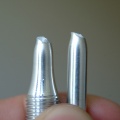Difference between revisions of "Gemstone based metamaterial"
(added section = Countering resource scarcity = to the top intro) |
(moved a lot of content out to new page: List_of_potential_gemstone_based_metamaterials) |
||
| Line 27: | Line 27: | ||
= Gemstone based metamaterials as foundation for advanced atomically precise gem-gum Products = | = Gemstone based metamaterials as foundation for advanced atomically precise gem-gum Products = | ||
| − | Diamondoid metameterials form '''the necessary basis for the yet speculative [[further improvement at technology level III|advanced applications]] of [[technology level III|the goal technology level]] | + | Diamondoid metameterials form '''the necessary basis''' for the yet speculative [[further improvement at technology level III|advanced applications]] of [[technology level III|the goal technology level]].<br> |
These highly complex applications will only become possible through the smart combination of the set of newly available metamaterials with novel properties. | These highly complex applications will only become possible through the smart combination of the set of newly available metamaterials with novel properties. | ||
| − | + | For a list of potentially possible gemstone based metamaterial go to the<br> | |
| − | + | '''main article: "[[List of potential gemstone based metamaterials]]"''' | |
| − | + | ||
| − | + | ||
| − | + | ||
| − | + | ||
| − | + | ||
| − | + | ||
| − | + | ||
| − | + | ||
| − | + | ||
| − | + | ||
| − | + | ||
| − | + | ||
| − | + | ||
| − | + | ||
| − | + | ||
| − | + | ||
| − | + | ||
| − | + | ||
| − | + | ||
| − | + | ||
| − | + | ||
| − | + | ||
| − | + | ||
| − | + | ||
| − | + | ||
| − | + | ||
| − | + | ||
| − | + | ||
| − | + | ||
| − | + | ||
| − | + | ||
| − | + | ||
| − | + | ||
| − | + | ||
= Robustness of AP microscale machine systems = | = Robustness of AP microscale machine systems = | ||
Revision as of 20:28, 30 October 2017
Up to more general definition: Metamaterial
The topic here are the base materials for all the products of gem-gum technology.
Simply by nanostructuring abundant elements they can (in the vast majority of cases) replace the scarce elements that are needed today. In fact the single element carbon suffices to replace almost all other materials.
|
tougher than metals |

A gemstone based metamaterial (or diamondoid metamaterial or gem-gum for short):
- 1) consists out of one or a few diamondoid base materials that means compounds that are suitable for advanced atomically precise technology
- 2) has a for the human senses imperceptibly small structuring. This structuring is usually formed by complexly interlocking crystolecules and possibly microcomponents.
The structuring gives the resulting material properties that are not native to the base material. In fact the properties of the gemstone metamaterial can be polar opposites of the gemstone base material (given a good base material with decent tensile strength is chosen).
For instance: The base materials usually have gemstone properties but a metamaterial made from these base materials can behave like rubber for human perception. The them "gem-gum technology" sometimes used here on this wiki refers to that fact.
Since there is a hyper-gigantic space of possible structurings there's an equally sized space of novel (mechanical) material properties that range from simple improvements over uncommon/unfamiliar material properties to outright alien stuff.
Countering resource scarcity
The wide range of material properties is achievable with just one (or a few) diamondoid base materials that contain just one (or a few) abundant elements. Thus gem-gum Technology has the potential to solve large parts of today's (2016) looming civilization problem of resource scarcity.
Specifically advanced elasticity emulating gemstone based metamaterials (gem-gum) makes mining after less abundant alloying metals for the most part unnecessary.
Contents
Gemstone based metamaterials as foundation for advanced atomically precise gem-gum Products
Diamondoid metameterials form the necessary basis for the yet speculative advanced applications of the goal technology level.
These highly complex applications will only become possible through the smart combination of the set of newly available metamaterials with novel properties.
For a list of potentially possible gemstone based metamaterial go to the
main article: "List of potential gemstone based metamaterials"
Robustness of AP microscale machine systems
- Natural background radiation won't hit a small part of a system for decades on average. Bigger systems can retain functionality reliably through redundancy.
- The digital nature of AP building blocks (copies have completely identical bond topology) makes them self correct their alignment in spite of thermal expansion. This allows for highly scalable system design. The same can be seen in digital electronics mechanical flaws up to 5% in length of chip structures and similar electrical flaws in voltage are self correcting.
- Effect of lack of defects - diamond gum:
Substances that are normally very brittle can take enormous strain (in the two digit percent range) when they're completely free of defects. With APM making completely defect free microscopic parts is easy. When those microscopic parts are combined back together in a smart way that prevents crack propagation (e.g. with interlocking shapes) this property can be retained into the macroscopic size range. See "emulated elasticity" for more details.
Lopsided volume ratio in metamaterial type usage
Due to the very high power densities (see here) that can be handled with diamondoid metamaterials, metamaterials for energy conversion (motors/generators) and transmission (infinitesimal bearings,...) will in most cases only take up a small fraction of a products volume. Leaving space for simpler design, more other functionality (e.g. data-storage) or allowing for highly collapsible design that get their shape by inflation with pressurized air.
Comparisons
diamondoid metamaterials - vs - diamondoid compounds
Note that there is a grey zone between diamondoid compounds and diamondoid metamaterials where it might not be 100% clear in which class they belong. In this grey zone there live e.g. compounds that including vacancies that are distributed in a checkerboard pattern. Is this just a different crystal structure (another polymorph or neo-polymorph in an pseudo phase diagram) or just a metamaterial.
One could call these cases low level metamaterials. A short note on low level diamondoid metamaterials can be found on the page describing diamondoid materials.
Specialized diamondoid metamaterials - vs - general purpose utility fog
Utility fog could be considered a very complex high level metamaterial. But since it has the maximum possible degree of general purpose capabilities it is not optimized for any specific purpose.
Instead of going the general purpose route which takes high design effort. One can:
- use diamondoid metamaterials that are much simpler to design (and maybe simpler to build too)
- use complexity instead to highly optimize for one specific application (e.g. street pavings, medium movers, ...).
- do something in-between those two extremes
The limits of metamaterials
Some combinations of material properties are just not permitted by physical law and can thus not or only to a small degree emulated by metamaterials.
Examples for this are:
- non polarizing optical transparency of thick plates is incompatible to isotropic electric conductivity (TODO: check inhowfar true)
- very high thermal isolation conflicts with very high compressive material strength
Notes
Depending on the design of the APM nanofactory that assembles the diamondoid metamaterials (See: vacuum handling) they can be organized in microcomponents or be monolithic.
Wikipedia's older definitions for metamaterials in (2014) did not mention mechanical metamaterials. As of (2016) mechanical metamaterials seem to gain more attention. A short section about them (structural metamaterials) has been added. according to wikipedia
External links
Diamondoid metamaterials allows to reach spots in the Ashby plot (density vs tensile strength) that are not accessible by non AP means of production.
- Pictures of Ashby plots on wikimedia commons: saturated-pixelgraphic; vectorgraphic; a scan of a detailed version
- Wikipedia(en): Selecting the best material overall
- Wikipedia(de): Spezifische Festigkeit

